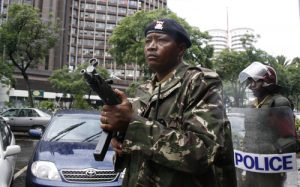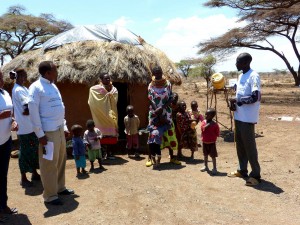Kenya (MNN) — Kenya is on the edge of spiraling into political chaos since their presidential elections were held last Tuesday. President Uhuru Kenyatta won re-election with a lead of about nine percentage points.

Kenya’s President Uhuru Kenyatta (Photo courtesy of MAKE IT KENYA PHOTO / STUART PRICE via Wikimedia Commons)
The opposition leader Raila Odinga stated he will not accept the election results unless his party is given access to the raw data from the commission’s computer servers. But, Odinga also added that he believes forms from polling stations have been “manipulated already”, according to CNN. Odinga called for his supporters to go on strike today in protest of what he calls a stolen election.
Gary Edmonds with Food for the Hungry has been associated with communities in Kenya for several years, and FH has ministry initiatives in Kenya as well. He explains why elections in Kenya can quickly hit a boiling point.
“So often, the political leaders come from one tribal group or another and people want to make sure that their tribal group is represented. So the election is not like us where we would go democrat or republican, we’ve got processes to seek justice, we’ve got processes to count the votes. There, it’s all a matter of if my candidate from my tribal group does not win or doesn’t get a fair shake on this, then I will be in a disfavorable situation because of my tribal background, because of the ethnicity with which I carry.”
Many in Kenya are haunted by memories of what happened after the 2007 elections. The country was generally unprepared for the violence that broke out and around 1,200 people were killed in ethnic clashes.

Police in Nairobi, Kenya (Image Courtesy: DEMOSH, Licensed under the Creative Commons Attribution-Share Alike 2.0 Generic | Wikimedia Commons)
This election season, police have been deployed in the capital city of Nairobi, Kisumu, Mathare, and other areas to quell violent protests. So far, 24 people have been killed in protests since the election. The international community is urging the people of Kenya to avoid violence in the wake of the election’s results.
Edmonds says there is also the economic impact to consider. “I know the last election when this happened back in 2007, there ended up with fuel shortages. Food stuffs were no longer able to be transported and so you found a situation where people didn’t even have access to food and water. So that’s been one of the fears here, that this would degenerate into a situation where there would be volatile and even violent reactions on the part of the population.”
When violence leads to an economic downturn, the results can prove dire. Already, 73,000 kids in Kenya are severely malnourished and at risk of starvation.
“It’s not simply that they don’t get to eat three meals a day, but they’re literally at risk of dying,” says Edmonds. “So when these kinds of violence or degenerated hostilities erupt in this kind of a nation, there might be things such as a fuel shortage. A fuel shortage means you cannot move food stuffs or water to different kinds of people, or that those who are in positions of power might actually begin to punish those who were part of the losing party and not move food stuffs and items like that.”
But in the midst of dangerous tensions, the Church in Kenya is not sitting still.
Edmonds says there have been Christians gathering together, encouraging reconciliation between groups, and hosting prayer walks in their communities.
“I had a friend who mobilized a prayer walk in one of the largest townships, Mathare, right there in Nairobi itself. And he said, ‘We’re going to walk and we’re going to ask people to come together in these kinds of ways because we’re Gospel people. We believe in reconciliation and we believe that this election does not need to degenerate into violence and hostility.’”
Edmonds admonishes that as followers of Christ, we need to take this goal of reconciliation seriously. “Gospel people over and over again are people who understand what reconciliation is all about. We have been reconciled to God through Christ, and at the same time, He has given us the ministry of reconciliation.”
Food for the Hungry will be mobilizing church leaders in Kenya towards reconciliation activities and are also part of a coalition of Christian relief and development organizations to bring aid, as they have in the past.
“We were part of that kind of effort to say, ‘Let’s figure out who has the food stuff, let’s figure out who has trucks, who has fuel, let’s figure out where people are most at risk and take steps to actively respond to the plight and the needs of the people in this kind of a time.’
“The other thing is that we’ve got a group of people right now who are advocating with government leaders and saying to them, ‘Let’s resolve your differences.’ They’re seeking to be, like Jesus said, peacemakers in that kind of a context.”

(Photo courtesy of Food for the Hungry)
Edmonds recently received a press release from FH’s program director. “He said, first of all, just pray for us. Pray that a spirit of peace would enter into the conflict, the hardships, that people would not use violent means to try to come to an end that they desire.”
In addition to the critical request of prayer, there are a few other things you can do to help in the situation, even if you don’t live in Kenya.
“We are working with groups such as World Vision, World Relief, UNICEF, Save The Children, and others. So know that we are collaborating, and as you would take a look, if Food for the Hungry is on your radar screen or any of these other organizations…this is an appropriate time to step up and make an extra gift, an extra donation.”
If you are moved to support Food for the Hungry as they send physical aid and Christ’s hope into Kenya, click here!
“Then the other part of it is, if you have relationships with churches or church leaders [in Kenya] — and there are many people in the United States who have had relationships with churches in Kenya — find ways to send them words of encouragement. Help them to continue to be on the streets, to be peace-builders, peacemakers in that kind of a violent and even hostile situation.”
Edmonds adds, “It’s not simply or solely a means of doling out foodstuffs to the people, but we’re constantly at work. We’re praying, we’re advocating, we’re seeking to, like the Scripture says in Romans 12, ‘be transformed by the renewing of your mind.’ And so we’re at work to renew minds to think in new and different kinds of ways, and your support helps make that happen.”
